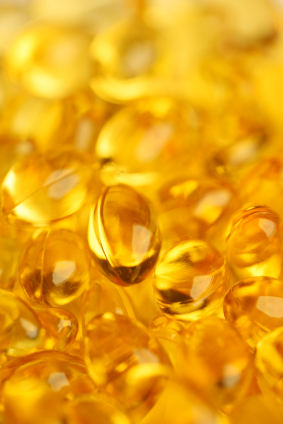MsFLASH and omega-3s
In early August, I posted two pieces about MsFLASH –Menopause Strategies: Finding Lasting Answers for Symptoms and Health — a network of studies evaluating potentially promising treatments for common menopausal symptoms. Started by the National Institutes of Health, MsFLASH comprises five research centers in Boston, Oakland, Philadelphia, Seattle and Indianapolis who are exploring various interventions for hot flashes, night sweats, mood disorders and sexual issues.
One of these trials set out to evaluate the role of omega-3 fatty acids in menopause, more specifically, whether or not omega-3s would be useful for alleviating hot flashes in women who prefer alternative strategies. Although the benefits of omega-3s are widespread, researchers have not been able to prove that they work against hot flashes. Consequently, over three months, 346 women took either three omega-3 capsules or placebo daily in addition to yoga, aerobics or usual activity. The women reported having roughly 8 hot flashes a day at the start of the study.
Unfortunately, the verdict is still out. Taking omega-3s appeared to have little effect on hot flash frequency or bother; declines in both measures were similar among women whether they were taking the fish oil or placebo (an average 35% decline in both groups and in both variables). What’s more, taking daily fish oil supplements didn’t appear to help sleep or mood. Personally, I find the lack of effect on mood surprising since there are data showing a benefit on depression, especially when it comes to DHA. However, even the researchers acknowledge that the lack of effect here might be due to the degree of depressive or anxiety symptoms that the women in this study experienced.
Regardless, if you are taking fish oils and have seen an improvement in symptoms, I would love to hear from you. Do they help? The search for the magic bullet for hot flashes continues but in the meantime, the more we share, the more we collectively know.
Read More
Got Low T? Low E? What?!!!
Do you recall the Low T campaign, you know, the one where Daryl Moose Johnston is able to ‘get back in the game’ once he starts correcting his testosterone deficiency? Well, not only is Darryl suffering from low testosterone levels but newly published research suggests that men like Darryl may also be suffering from ‘Low E,’ as in estrogen. Can you hear the ‘cha ching’ in the background yet?
As researchers continue to unravel the mysteries of how declining testosterone affects men, they’ve discovered that testosterone has a partner in crime: estrogen. In fact, not only does it appear that different men need different levels of testosterone in their body to maintain their lean/fat mass balance, muscle strength and size, but as testosterone levels begin to decline as men age, so does estrogen and with it, men may be left with the accumulating middle tire that many of us women are quite accustomed to. Moreover, findings from the study mentioned above show that both testosterone and estrogen regulate sexual function in men.
A bit of context here just so we are on the same page. This recent bit of information comes from a study of 198 men between the age of 20 and 50 who were healthy and had normal testosterone levels. In men, ‘normal’ equates to ranges that decline as they age. The estrogen component is a bit trickier to explain; more than 80% of circulating natural estrogen in a man’s body comes from the conversion of testosterone. So, as testosterone levels start to decrease, so do estrogen levels. And, when some of the men in the study were provided with a steroid agent that blocks that conversion, they experienced an increase in body fat percentage. Another important point was that fat began to accumulate at testosterone levels well above the levels that would affect muscle strength and size, i.e. 300 to 350 ng. Finally, in both groups of men — those who received various levels of testosterone and those who received various levels of testosterone and a hormone to prevent conversion to estrogen — declines in desire and erectile function similarly declined as testosterone did.
Back in March, I wrote a post about hormone deficiency in men and following the money trail. Mind you, declining levels of testosterone (and by default, estrogen) can have significant consequences for some men that go well beyond sexual dysfunction or a bit of body fat. Consequently, by conducting this research, scientists will be better able to help men whose testosterone levels fall below a certain point, although estrogen replacement comes with its own set of problems (enlarged breasts anyone?). Aside from the obvious benefits, such as a better strategy for interpreting testosterone levels, identifying any negative consequences that might be associated with them and treating them accordingly, one has to wonder if the conversion of testosterone to estradiol or lack thereof, is a harbinger for a future campaign.
Got low T? Got Low E?
Need I say more?
Read More
Send them an angel: IMAlive & Suicide Prevention
Did you know that suicide is the third leading cause of death among American teens? Or, that the vast majority of these young people who think about suicide or make actual suicide attempts have underlying mental disorders?
Pretty shocking, isn’t it?
I would like to take a distinctly different path on Flashfree this week and share a story with you, a story about a young man with a promising future and a unique vision who didn’t see what others saw in him. This past July, this beautiful, vibrant 17-year-old took his life, and with it, an unrealized life path that would have definitely turned out very differently than the pathway that his despair showed him. I know his parents, I heard firsthand, the anguish in his mother’s voice, and I witnessed the outpouring of love that would have been his for the taking. I wish he had known.
Teen suicide is alive and real. And unless we take action to start helping our teens, we will likely lose a huge piece of our and their future.
Yesterday was World Suicide Prevention Day. However, the entire week marks National Suicide Prevention Week, comprising efforts to raise global awareness of the warning signs of suicide and help promote help for those who need it most. In honour of this week, and most importantly, of teens like my friend Jacob Weiskopf (who, because of an underlying depression, may be unaware of the choices that they can make to get their lives back on track), I am raising money for the Kristin Brooks Hope Center. This money that will go toward making the IMAlive online help line a 24-hour/7 days a week reality for teens and adults who are likewise, considering a path of no return. And, I am asking you to join me and some of my friends on Team Jacob and make the 24-hour window a reality. A little – $10, $20 – can go a long way toward our goal of $10,000.
One life is huge. How about it? Can we send Jacob and others an angel?
Read More
Work and the ‘pause: a two way street
Can you believe that three years has passed since I first wrote about Amanda Griffith’s study on menopause and work? The final results are in and they are fairly indicative of the issues that menopause brings to the work environment.
Dr. Griffiths is a professor at the University of Nottingham in the UK. Several years ago, she and her colleagues set out on a journey to discover gender-specific health issues in the workplace other than pregnancy. And, since her target was on women between the ages of 45 and 55, chances are great that the focus would be less on reproductive issues and more on post-reproduction, i.e. menopause. Noting that studies have shown that some women find that their symptoms negatively impact their work life, and that certain work factors, e.g. environment, may increase the intensity of symptoms, Dr. Griffiths also points out that women are generally reluctant to divulge to colleagues or their managers that they are going through menopause. Moreover, even if employers know, what sort of things can they do to help?
Mind you, this study is in the form of an electronic questionnaire and this is the type of design that many will question as introducing bias and issues with recall. However, rest assured, the researchers carefully honed their questions based on an earlier study that was done with a group of women police officers, through one on one interviews with women to discuss the impact of menopause on their health and work and through close review and evaluation by experts in a variety of medical and occupational fields. But enough of the science; let’s get to the meat.
Roughly 900 women were surveyed; about 43% were perimenopausal, 31% in menopause and the rest, on hormones or in menopause due to surgery. Yet, regardless of where they were in their menopause journey, three symptoms were especially problematic when it came to work: feeling less confident, an inability to concentrate and memory issues. Three’s a charm…except when it comes to menopause. The icing on this cake were hot flashes; not only were women unable to control the temperature in their workplace environment (honestly, who does have that ability?!), but having hot flashes became unbearable when the work environments were overly heated or improperly ventilated.
To make a bad situation even worse, over a third of the women said that they worked harder to overcome difficulties so that menopause wouldn’t affect their performance or draw attention to them. Working harder also meant learning the best strategies for coping with their symptoms and worklife. And while, on the surface, this doesn’t sound so terribly awful, can you imagine having to make light of matters, making a list and checking it thrice to avoid mistakes or changing your working hours to hide a condition?!
Managers, take note! What do women want to make their workplace more tolerable? Overwhelmingly, women report that they would be better served if management acknowledged that menopause was a possible health problem and provided more flexible working hours. Better ventilation, air conditioning and temperature control are important. And advice and support? More than 50% of women said that having information and advice from their employers about menopause and coping at work as well as informal support from colleagues would make their work environments more palatable. On the flip side? The researchers say that it might be helpful to explore working women’s attitudes toward their co workers and line managers’ perceptions of menopause; after all, women in the throes of the ‘pause may actually be overestimating others’ abilities to infer menopause status when a hot flash hits and may even have misconceptions about others’ negative perceptions of menopause.
There is no doubt that menopause impacts working ability, environment and relationships. As with any health condition, appropriate support from employers is imperative and may help to reduce stress, help boost performance and insure loyalty. Yet, employers can’t do it alone; women need to be able to communicate their status and their needs. Work and the ‘pause is truly a two way street.
Read MoreMood and the grape
 Drinking wine can lower the risk of developing depression? It seems counterintuitive, doesn’t it, particularly because many studies have shown a direct association between alcohol consumption and depressive symptoms. Yet, Spanish researchers are now reporting that light to moderate drinking might actually yield mood benefits.
Drinking wine can lower the risk of developing depression? It seems counterintuitive, doesn’t it, particularly because many studies have shown a direct association between alcohol consumption and depressive symptoms. Yet, Spanish researchers are now reporting that light to moderate drinking might actually yield mood benefits.
Before you head out to buy a few bottles of your favorite variety, there are a few key things that you need to know. For example, the original purpose of this study was to learn how a Mediterranean diet supplemented with extra virgin olive oil or mixed nuts might help prevent heart disease In roughly 5,000 men and women with existing risk factors. It just so happens that their alcohol intake were part of overall dietary measures. So, when the researchers went back into the data, they divided these drinkers into groups based how much they drank a day, and how often wine was part of that consumption. here’s the rub: while drinking two to seven glasses of wine a week was associated with halving the risk for developing depression, those glasses of wine translated into 5 to 15 grams at most, per day. Do the math; that’s equal to .17 to .5 ounces of wine daily. A half ounce of wine!
The reason for the protection against depression is that it is believed that depression and heart disease may share the same underlying mechanism. What’s more, wine contains certain non alcoholic components, resveratrol for example, that may protect wine drinkers from developing depression. Still, the same benefits are not seen when the amount of wine consumed daily exceeds a half ounce.
The lesson is clear: the headlines might be promising but don’t always deliver the goods. Meanwhile, I am a huge believer in the power of the grape, even if it doesn’t promise to boost my mood.
Cheers!
Read More










